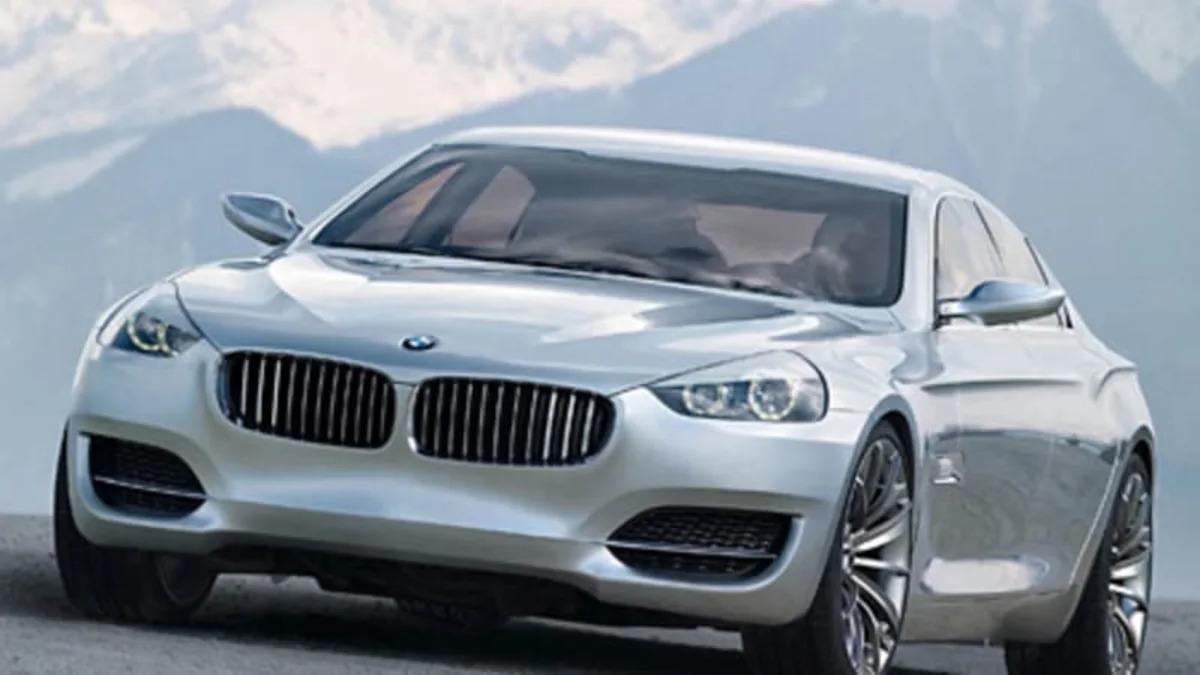Click above to view high-res gallery of the BMC CS concept
The current worldwide economic climate has claimed yet another automotive casualty: the BMW Concept CS. The German automaker cites a distinct lack of profitability as the main reason the CS project has been canceled. Last quarter, the boys and girls from Bavaria returned a profit of just 1.3% from its global automotive operations, and a low-volume halo sedan like the CS would only serve to drive that figure further downward. So, expect the brand-new 7 Series to remain at the top of BMW's model lineup for now.
If not the Concept CS, what current projects are keeping BMW engineers hard at work? Efficiency, fuel consumption and vehicle emissions. As part of the company's new Strategy Number ONE (outlined after the jump), the Munich-based automaker is pushing forward its EfficientDynamics project, which should add technologies such as stop/start and hybrid drivetrains to its mainstream models. After the all-electric MINI E makes its debut at the LA Auto Show, expect BMW to work in earnest on its next city car project that could be a revival of the iconic Isetta brand.
[Sources: Automotive News - sub. req'd, BMW]
Press Release:
Quarterly Report to 30 September 2008
The performance of the BMW Group in the third quarter 2008 was perceptibly influenced by the economic downswing in the wake of the financial crisis. Ongoing consumer reticence in the main sales markets, the weak state of the used car markets as well as increasing refinancing costs had a substantial negative impact on the earnings of the BMW Group.
Model life-cycle factors affect car sales volumes.
In addition to the ongoing adverse business climate, the BMW Group's third-quarter performance was also influenced by model life-cycle factors, particularly in relation to the BMW brand. Between July and September 2008, the BMW Group sold a total of 349,098 BMW, MINI and Rolls-Royce brand cars, 4.2 % down on the previous year. The number of cars delivered in the nine-month period increased marginally (+ 1.7 %) to 1,113,972 units.
Market conditions for the motorcycle business were also difficult. The third-quarter sales volume achieved by the Motorcycles segment was nevertheless ahead of the previous year's high level. In total, 24,818 motorcycles were sold during the period (+ 5.4 %). During the first nine months of the year, 80,750 BMW motorcycles were handed over to customers, 2.5 % short of the number sold in the corresponding period of 2007.
In the Financial Services segment a total of 2,971,437 (+ 17.0 %) lease and financing contracts with dealers and retail customers were in place at 30 September 2008.
Negative impact of financial crisis on revenues and earnings.
Third-quarter Group revenues decreased by 8.6 % to euro 12,588 million, reflecting the noticeable reluctance of customers to spend in the face of the crisis on international financial markets. Despite this extremely unfavourable situation, the BMW Group, with revenues of euro 40,425 million, was nevertheless able to maintain nine-month revenues at the previous year's high level. Adjusted for exchange rate factors, Group revenues for the nine-month period were up by 5.1 %.
Earnings for the nine-month period reflect the ongoing effect of the various adverse external factors described above. In the third quarter 2008, the BMW Group increased the cumulative amount of expense recognised for additional risk provision for residual value and bad debt risks to a total of euro 1,037 million. On top of this, expenditure in conjunction with previously announced measures to reduce the workforce reduced nine-month earnings by euro 258 million.
The third-quarter profit before financial result fell by 60.2 % to euro 387 million. The profit before financial result for the nine-month period, at euro 1,639 million, also dropped steeply (- 43.6 %). External factors also took their toll on the Group's pre-tax earnings. The profit before tax of euro 279 million for the third quarter was 63.5 % lower than one year earlier, while that for the nine-month period fell to euro 1,522 million (- 43.3 %).
The BMW Group recorded a net profit of euro 298 million for the third quarter (- 62.9 %). The net profit for the nine-month period was 39.7 % lower at euro 1,292 million.
Outlook overshadowed by financial crisis and uncertainty.
Business conditions have deteriorated further for the BMW Group over the past months. The escalation of the financial crisis and the signs that this will spill over to the real economy have increased the risk of a worldwide recession. The cyclical downturn is going hand in hand with a noticeable reduction in consumer spending in numerous markets. A further contributing factor here is the ongoing debate about CO2 emissions which is also having the effect of unsettling customers, causing them to avoid, or at least put off, the acquisition of consumer goods, in particular long-lived goods and equipment. A significant level of volatility on the financial and commodity markets poses the risk of even greater uncertainty.
The market situation has therefore also deteriorated sharply for the automobile industry. Private consumption and consumer confidence have dipped perceptibly, particularly in the USA, the BMW Group's largest single market for cars, but also in Europe. The situation on most of the world's emerging markets remains robust. It is likely, however, that the dynamic growth rates registered on these markets in recent years will be trimmed back as a result of the financial crisis. In the triad of traditional car markets, the number of new registrations will drop sharply for the full year 2008 compared to the preceding year. The side-effect of the economic downturn - namely some signs of easing pressure on raw material markets and a slightly stronger US dollar - are nowhere near sufficient to offset the extremely high level of expenses that have had to be borne.
The BMW Group cannot avoid the effects of these developments. The uncertainties that result from the adverse factors described make reliable forecasting difficult, even rendering it almost impossible to make reliable assertions for the near future.
Taking all of these factors into consideration, the BMW Group estimates that it will no longer surpass the previous year's record sales volume figure in its automobile business. Due to the prevailing adverse climate and the uncertainties caused by the financial crisis, the profitability targets set for 2008 are no longer achievable. In particular, it cannot be ruled out that the risk provision for bad debts and lease financing will have to be increased again before the end of 2008. Given the difficult business conditions described above, the likely progress of business over the coming months cannot be forecast with any exactitude. For this reason, it is not possible to predict the level of Group earnings for the year, other that they will continue to remain clearly positive.
The BMW Group continues to aim to achieve a return on sales of at least 6 % in 2010. The corresponding EBIT margin in the Automobiles segment would then be just under 6 % or better. This does, however, depend on the markets recovering.
Strategy Number ONE focusing on right areas.
The BMW Group has taken measures at an early stage to deal with changing business conditions. It is reacting to the challenges that it faces primarily by putting in place various sales strategies aimed at managing sales volumes around the world. Throughout this, the BMW Group remains sharply focused on earnings. This also includes aligning sales volumes in specific markets to actual demand. The BMW Group remains committed to sustaining its strong market position in the countries and regions involved, maintaining a high level of customer satisfaction and ensuring the stability of the dealer organisation. This allows the BMW Group to be able to react quickly and take advantage of the situation as soon as demand revives.
The extreme flexibility of the BMW Group's production network provides a competitive edge in terms of the ability to realign production volumes where necessary. Thanks to the use of flexible working methods and working-time accounts, the BMW Group can direct its production capacities highly efficiently to changes in demand on the various sales markets. Its customer-oriented sales and production processes enable capacities and sales processes to be adjusted flexibly and at short notice. The BMW Group remains committed to its "production follows the market" philosophy.
In the light of the current negative developments, the strategy "Number ONE" is proving to be an appropriate and forward-looking entrepreneurial decision. In the light of the various challenges that it faces, the BMW Group is now intensifying its efforts to implement its new strategic alignment. Despite the current gloomy climate for consumer spending, the BMW Group is convinced that the measures it has initiated will generate benefits in the medium term. This confidence is based, amongst other things, on a discernible trend towards more efficient drive systems. Technological expertise represents the key building block for the future success of the BMW Group. The competitive edge achieved with EfficientDynamics is a clear demonstration of this. Upfront investment in this area provides an important basis for taking advantage of medium and long term opportunities.
The BMW Group will continue to invest in the future on a long-term basis despite difficult market conditions. Given the various adverse factors described above, initiatives to improve profitability will also be reinforced. Measures aimed at increasing efficiency and improving productivity ensure that resources are put to their best use. On the cost side, those measures also represent another important aspect of the BMW Group's new strategic direction. Substantial progress has been made during the year to date, most clearly evident in the sharp focus achieved in the area of research and development spending.
The profitability targets for 2012 set in conjunction with the strategy "Number ONE" remain in place. The BMW Group will remain on its strategic course by speeding up cost cutting and efficiency improvement measures. The target is then to achieve a return on capital employed (ROCE) in the Automobiles segment in excess of 26 % and a return on sales of between 8 % and 10 %.



Sign in to post
Please sign in to leave a comment.
Continue